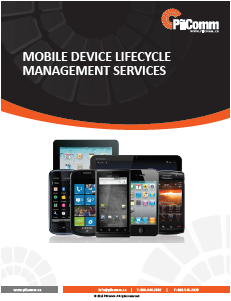
Why Some Companies are Slow to Adopt Enterprise Mobility While BYOD Keeps Pushing Forward
Although enterprise mobility improves business operations and productivity, especially with bring-your-own-device (BYOD) models in the workplace, some companies are slow to adopt enterprise mobility for their organizations. This hesitance is due to several factors, with change being the biggest one.
For companies to successfully adopt enterprise mobility, they must be willing to overhaul IT architecture, keep security a top priority, adapt to constant changes in the mobility world, and provide user-friendly technology for clients and staff. Enterprise mobility services can help companies make the change and operate smoothly with modern, productive technology.
That said, there are still a number of reasons companies are hesitant to jump in and make the adoption:
Reconstruct IT Architecture & Security
Changing a company’s IT architecture to mobile can seem difficult at first, and can be daunting for companies that have a large and well-established IT architecture. For a successful transition to enterprise mobility, IT departments must create a mobile-first architecture that:
- Establishes a mobile cloud service to manage devices and mobility services
- Focuses on app creation
- Utilizes stringent security features to protect the company’s network and data
Keep Up With Fast & Constant Changes
Some companies may be hesitant to adopt enterprise mobility because it is constantly changing. Mobile device technology changes all the time. Software and devices are constantly being upgraded, and are used with varying operating systems. This means IT personnel must stay on top of these changes for a successful enterprise mobility operation.
Enterprise mobility services can help companies stay on track with the ever-changing mobile technology world. These services include:
- Managed mobility services
- Mobile app services
- Asset sourcing and management
- Mobile device management
- Network services
- Mobile consulting services
- Helpdesk support
Adopt User-Friendly Technology
Another change involved with enterprise mobility is the shift to focus on user’s needs. Whether companies are creating apps for customers or staff, user-friendly technology must be at the forefront of design goals. If customers cannot easily use a company’s mobile app, they will probably stop using it and end up going elsewhere for business. Staff also need user-friendly technology on their devices to be productive in the workplace.
BYOD’s Success in the Workplace
Once a company is willing to embrace change and adopt enterprise mobility, there is another major factor to consider: BYOD vs. corporate-issued devices. BYOD is very successful in the workplace because it boosts productivity and also saves companies significant amounts on devices and mobile plans. An article on preferences for BYOD in the workplace compared to corporate-issued devices looks at the following factors:
Costs
With corporate-issued devices, companies must pay for the devices, the data plans, and the high costs of over-usage with data plans. With BYOD, staff pay for their own devices, plans, and over-usage fees, so companies don’t have to fork out these extra costs.
User Preferences
Staff prefer using their own devices for work because they are more familiar and comfortable with personal devices and they don’t have to keep track of two devices all day. Although corporate-issued devices can be user-friendly and cheaper for staff, they are an extra device that staff must carry with them throughout the work day, which is often considered a major inconvenience.
Security
When corporate-issued devices are difficult to use to complete certain tasks, staff may copy data from these devices and send it to another device for improved access and productivity. This can compromise the security of company data and networks, exposing companies to security breaches and theft.
BYOD programs utilize enterprise mobility services to ensure that company data is secured in digital containers and can only be accessed during specified times, locations, and with user authorization. These security measures prevent staff from placing company data at risk of exposure.
Legal Issues
Companies are also opting for BYOD programs to avoid being held liable in any legal issue. If a corporate-issued device is used as evidence in a court case for an employee’s actions on their personal time, companies must get involved. This can become time-consuming and costly for companies.
Although change can be scary, when it comes to improving business with the latest technology, companies shouldn’t worry.
By embracing enterprise mobility and adopting BYOD programs, companies can boost productivity, improve client and employee satisfaction, ensure network and data security, and avoid the added costs of corporate-issued devices. And to make things easier, enterprise mobility services are available to help with a smooth transition to the future of technology in the workplace.
Learn more about managed mobility services: click here

